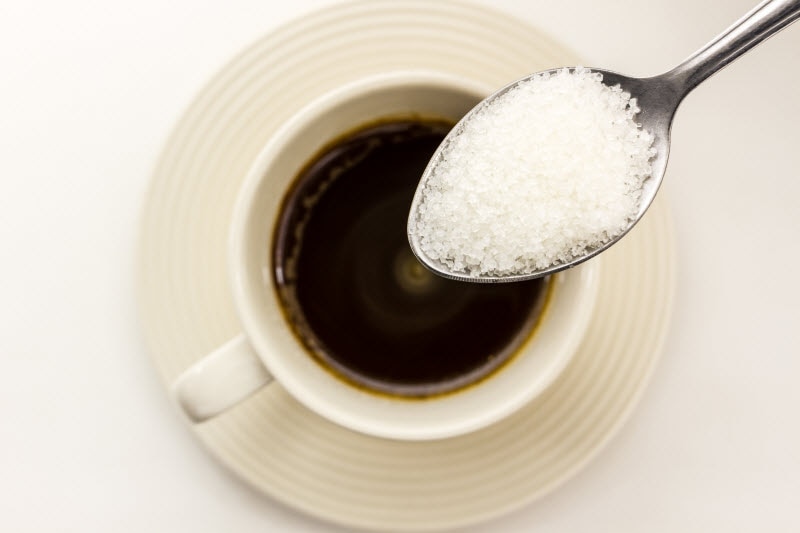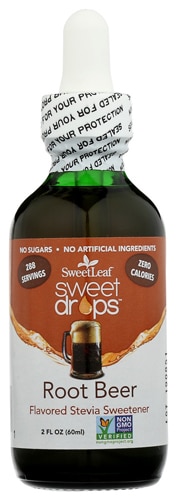[vc_row][vc_column][vc_column_text]You may have seen recent headlines warning that a
new study linked
erythritol to cardiovascular events such as heart attacks, stroke and even death. But is this popular calorie-free sweetener really a danger to your health? Before you clean out your pantry, let’s take a closer look at erythritol and the study to see if erythritol is safe or not.

What is erythritol?
Erythritol has gained popularity in the last few years as a zero-calorie sweetener used to replace sugar. It’s only about 60% to 70% as sweet as sugar, though, so people may find themselves using a greater amount of erythritol than they would sugar.
Erythritol is a sugar-alcohol made primarily from corn. Manufacturers either ferment the sugar from corn, which converts it to erythritol, or they use an electrochemical process to produce it.
Research shows that our bodies do not absorb
sugar-alcohols. They are undigested or only partially digested in our guts. This can cause stomach upset in some people.
Most of erythritol, about 70%, is
absorbed into the bloodstream from the small intestine and excreted in the urine. The remainder is
fermented by bacteria in our colons or excreted in feces.
While erythritol is not technically an
artificial sweetener, it can be considered a synthetic sweetener as you won’t find large amounts of it in nature.
Note that erythritol is not entirely calorie-free. It has 0.2 calories per gram whereas sucrose (white sugar) has four calories per gram. For reference, four grams equals a teaspoon, so a teaspoon of erythritol has just under one calorie.
Our bodies also can produce erythritol. It’s made in the pentose phosphate pathway. The
pentose phosphate pathway has many roles, one of which is metabolizing glucose. We see an increase in this pathway’s activity when the body is under oxidative stress, has increased inflammation,
type 2 diabetes or
obesity.
Is erythritol safe?
If you read the recent news stories warning of a risk between erythritol consumption and cardiovascular events, you might be ready to ditch the sweetener altogether. Let’s take a look at the study.
The
2023 study published in Nature reported an association between blood levels of erythritol and an increased incidence of major cardiac events. The higher a person’s blood level, the higher their risk of a heart attack. The first part of the study was a discovery period and followed 1,157 people for three years.
Next was a validation cohort of just under 3,000 people who were monitored for three years. They found that those with higher blood levels of erythritol had higher rates of fatal or nonfatal heart attacks and strokes.
What else do we know about the participants in the study?
- Average BMI was 29
- Greater than 22% had type 2 diabetes
- Greater than 70% had hypertension
- Greater than 69% had coronary artery disease
- Greater than 16% had heart failure
- Greater than 39% had already had a myocardial infarction (heart attack)
The people in the study were not healthy; in fact, overall, they were pretty sick.
We know that the
pentose phosphate pathway is more active in unhealthy individuals. The more active the pentose phosphate pathway, the more erythritol is produced in the body.
This means that the individuals in the study likely had high levels of erythritol due to their chronic diseases, not necessarily because they were consuming erythritol.
Test subjects in the cohort group only had their erythritol levels checked once as an overnight fasting level when they first enrolled in the study. Blood erythritol levels were not checked during the three years the participants were followed.
The researchers did not do a dietary recall, so we don’t actually know if the subjects were consuming any erythritol in their diets.
In the next part of the study, researchers added erythritol to a Petri dish with platelet-rich plasma. They found that the platelets clumped together when the erythritol was added, indicating increased blood clotting and thus increased risk of cardiovascular disease. They then injected mice with high doses of erythritol and found the same thing, high rates of blood clot formation.
To transfer this information to humans, eight study participants were each given a beverage with 30 grams of erythritol. For context, 30 grams of erythritol is seven and a half teaspoons. After consuming this drink, their blood erythritol levels increased 1,000 times from baseline and remained elevated for two days.
We know nothing about the eight participants who drank the erythritol-sweetened beverage. We don’t know if they had any chronic diseases or if they regularly consumed erythritol or not.
The authors of the study conclude that consuming erythritol leads to a potentially increased risk of blood clots and cardiovascular events.
This is a concern for the population who may be using erythritol, which consists of individuals who want to lower their sugar intake – such as people with diabetes, obesity or heart disease. They are already at risk for heart attacks, so using erythritol may increase that risk.
To draw the conclusion that consuming erythritol causes major cardiac events is erroneous. The study implies that the oral consumption of erythritol is essentially the same as the erythritol that’s naturally produced in the body.
Also, testing platelets and erythritol in a Petri dish and in mice is not the same as testing human subjects.
Overall, the study can only show an association and not direct causation, meaning we don’t actually know if consuming erythritol increases the risk of cardiovascular events.
Are there any benefits to erythritol?
Several studies have shown erythritol to be
a safe alternative to sugar. Research shows that
erythritol does not raise blood sugar or insulin levels, which is beneficial if you have diabetes. It also reduces ghrelin, which is your hunger hormone. This can be helpful if you’re trying to lose weight.
The safety of erythritol is based on extensive research in
humans and
animals.
It’s actually better tolerated than other sugar-alcohols as most of it is absorbed in the small intestine and eliminated in urine. Whereas other sugar alcohols make their way to the large intestine where they are fermented and can cause gas, bloating, and/or diarrhea.
Given the increasing rates of type 2 diabetes and obesity, it brings to question if warning against erythritol is actually warranted.
Using a well-tolerated, nearly zero-calorie sweetener in place of sugar has many benefits and can be useful in helping those with diabetes better control their blood sugars and reduce total calorie intake for those wanting to lose weight. It’s also a good sugar alternative for those who are avoiding sugar for general health purposes.
We know that high consumption of sugar increases the risk of diabetes, heart disease, cancer, obesity and
metabolic disease, but where are the headlines warning against sugar intake?
Other sugar alternatives to consider
If you feel like the jury is still out on erythritol and that more research is needed, there are other sugar alternatives available. Many people actually prefer them over erythritol.
Allulose and
xylitol are both good options to consider. Allulose is 70% as sweet as sugar and actually tastes very similar. It doesn’t have the cooling aftertaste of sugar-alcohols.
Xylitol’s sweetness level is about the same as sugar but know that people do tend to report more gastrointestinal issues with it than other sweeteners.
Overall, it’s up to you if you want to steer clear of erythritol or not. The take-home message is to examine how much sweeteners and sugar you’re consuming on a regular basis.
We’ve become very conditioned to “want” and “need” a bit of sweetness in our diets. But is it necessary or beneficial for our overall health?
If your goal is to improve your health, it might be best to work on reducing all sources of sweetness in your diet.[/vc_column_text][/vc_column][/vc_row][vc_row][vc_column][vc_text_separator title="Featured Products" border_width="2"][vc_row_inner equal_height="yes" content_placement="middle" gap="35"][vc_column_inner width="1/3"][vc_single_image image="166679" img_size="full" alignment="center" onclick="custom_link" img_link_target="_blank" css=".vc_custom_1683393292150{padding-right: 7% !important;padding-left: 7% !important;}" link="https://www.vitacost.com/now-foods-xylitol"][/vc_column_inner][vc_column_inner width="1/3"][vc_single_image image="166680" img_size="full" alignment="center" onclick="custom_link" img_link_target="_blank" css=".vc_custom_1683393310398{padding-right: 7% !important;padding-left: 7% !important;}" link="https://www.vitacost.com/whole-earth-sweetener-erythritol"][/vc_column_inner][vc_column_inner width="1/3"][vc_single_image image="166681" img_size="full" alignment="center" onclick="custom_link" img_link_target="_blank" css=".vc_custom_1683393329639{padding-right: 7% !important;padding-left: 7% !important;}" link="https://www.vitacost.com/wisdom-natural-sweet-leaf-monk-fruit-granular-organic-sweetener-28-2-oz"][/vc_column_inner][/vc_row_inner][/vc_column][/vc_row]




